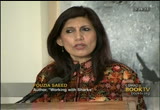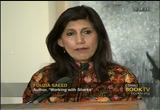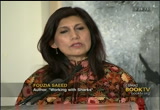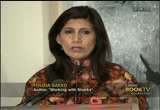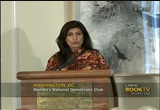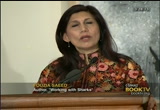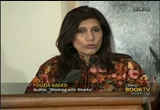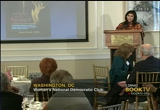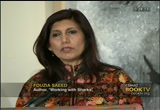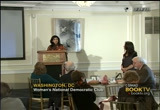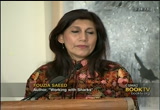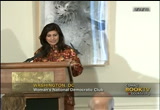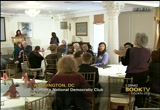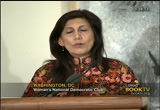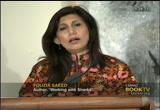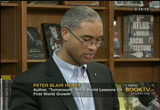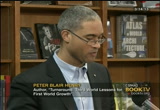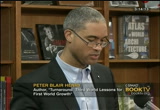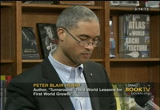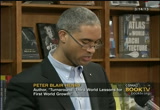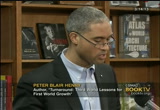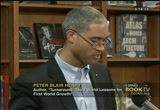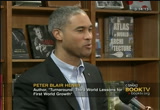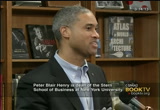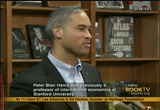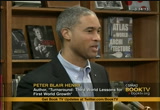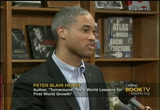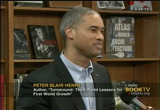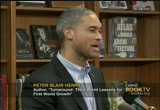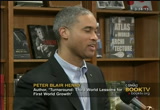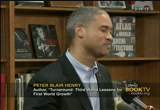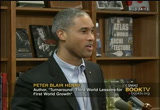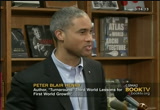tv Book TV CSPAN April 20, 2013 10:00am-11:01am EDT
10:00 am
10:01 am
the mechanism is one thing. the greeting that oxygen, the way we can breed of the greeting as space for rigging a plan and not be bastrop away. women who complain, stigma and retaliation. that is the part that probably would need to focus on. the other thing i felt was that it was really a universal issue. i, during my struggle in the last ten years, have probably read about every sexual-harassment case.
10:02 am
and every country, i went to japan a month ago and there it was everywhere in the public place and offices. so i felt like this is something that we really need to a not divide up the world, and this is the part where women have problems and this is a part of the world that has the outcome. we will need to develop a bond of solidarity. when need to talk about our struggles. countries like pakistan, one case of a gang rape or something happens and then it goes into the media and then they put on a flag in a goes round and round. not understanding the dynamics and not really knowing anything about the struggles. i know that there was and incident in the case a while ago, but for the past four years rehab been really having a struggle, and the movement that actually culminated in passage
10:03 am
of legislation. the other one is on the way. but some of the media does not really talk about our struggles and our improvements and changes that the struggles culminated. i thought that this book, especially in the united states will also mean that i am, at least on my behalf, i am making an attempt, reaching out, and sharing our struggles, not our problems only, but our struggles so i hope that you will stand in solidarity with me and share our struggles and talk to others about it because it is not just that we have mild cases, but all these struggles are decades old and are fighting against centuries-old patriarchal systems, not just one government or another government or one country or the other country. so i would be very happy to hear your comments after you have
10:04 am
10:05 am
10:06 am
[indiscernible] >> the first was about the un. >> each question. we have to now. one is an amendment in pakistan which is sort of our mainstream criminal law. in the amendment define sexual-harassment, and then it says that if it happens, if this kind of behavior happens at home or in the public transport or public works base is punishable by law. the finest 3,000, about. and the other one is performing sector, and that requires the management of every organization to have an anti sexual rest of policy which is prescribed and law.
10:07 am
also, it doesn't have every member inquiry committee, and there are other details that it requires of them so that every organization has its own mechanism. it also provides for an ombudsman. so that is law. in terms of other countries, the research, there are pretty good documentation is about this, which country is somewhat. pretty good, like malaysia has the legislation. in south asia, pakistan has the strongest. they also have amendments. bangladesh has amendments. afghanistan also as amendments. the scandinavian countries also have very strong legislation, and that is working well to. i also make a comment about the steady of all these centuries. usually people divide up into the schools of thought.
10:08 am
the remedies that the legislative remedies. one is more focused on the right , like the united nations -- the usa, and the other one is more focused on the behavior. so our legislation falls into the wave year. we don't go after the company's and ask for big amounts through compensation. so there are different kinds of laws. here the big compensations, i have not done a full analysis other has worked. for now companies -- sometimes is companies do a lot of talk of things to be clear that. they have had so many hours of training in this and that's the they are -- we did all that we could. but in pakistan it is the other way around. there we are making management offense. so we're not stopping and the management and we're saying to listen to anybody can be a russert.
10:09 am
you need to get your system. it is -- it works the l.a. around. so the burden is on the management from a limitation, but actually, the punishment. [inaudible question] >> they keep. >> i salute you. all the women mobilize threat the country. it is inspiring. i realized that i have a couple of questions. one is to mike troy up during the sexual-harassment days, women's rights, the general
10:10 am
domestic violence. all of your efforts. this started. eleven have always. some kind of environment. this case. many of them -- >> okay. first question, yes. a lot did actually have a lot of spin-off benefits. that is a lemon scent. because these laws were passed and there was such a nationwide applaud that the government began -- the parliament became open to the other laws. there we took the other laws that got past because of this one. and also, the issue is so
10:11 am
tabooed, even the sexual assault and rape, and these issues are also so tabooed that now people are starting to even the president and prime master and the speeches of the anti sexual-harassment law. okay. now the world is getting very popular. so now it is almost creating a space where even in cestus coming out of the space. so rather than saying incest was it would not to run television a lot of sexual violence and sexual assault and rape is also coming, which is heated. fine. other terms. for example, rape, we do not have that yet. but we are coming close. when is that the case of the new york. we had it outside the un system.
10:12 am
this big panel was all racing from outside. other u.n. agencies. very supportive. and we get a lawyer at that stage also it was extremely good. you will read all about them in the book. after that nobody really approached us even though the un system started turning. as of the manager that was required to take wanted to. the sense of things happen. @booktv the task force, but nothing really has happened in the mindset of the culture, i believe. i am open to anybody this case coming out. if somebody wants to close the case ever happy to talk to them. we would like that.
10:13 am
the way i put it is that i really feel like they are yearning for a variant. think that it would be very nice to have this completed and no lives. and so we can really move on. there are still streams. a lot of angle -- anger still because of the management evaluation. it will be nice if anybody in the u.s. system does a protest. >> reading about india's problems recently. take a look at that. in that state six segments are being charged that. and the women in india, i am not somalia with any laws. and then some things that we can do to help really get on board and try test stand up for a
10:14 am
better life. >> the sexual-harassment bill has been pending for last three years. and i was hoping that with our -- with the passage of our bill there will also kind of get the mobilization, but has not been passed at. they hav legislation for rape. they have some good judgments and repulsive, but i think that the women's movement is really pushing for better legislation, especially related to evidence. i am hopeful. we do connect up a bit, even though i think we have had more connection with other countries in terms of sexual-harassment. in afghanistan result of a movement based on hours because there were very happy with it, so the movement. they focused on universities. they get first the domestic violence legislation and then an amendment on sexual-harassment.
10:15 am
right now we're doing with -- hoping a mile of the legislation. the chinese also get all our documents translated in china is -- chinese. i went there also to give. so there is some connection. i hope that more can happen. >> of like to commend your efforts. in the future, your opinion on how to bring change to the future outpouring -- the fuel systems and believe in a two-pronged approach. >> legislation and accountability systems are on the other. that of the greeting go with one or the other. we have to go both ways. the more the accountability the
10:16 am
better it is. if you can get away with things. and to my would save command terms of global change, universally of the issue, pitcher to still exists in almost all countries. this canadiens to my think will come close to getting a balanced agenda, bounce, but otherwise in our countries it is more in our faces other countries it is a bit more glossed over in suckled uncivilized. but as very deep roots universally, so we need to bond together. another thing is that they should never be in my opinion many is women and men that is our movement has been. in pakistan we have a very organized women's movement and make a lot of fuss about things with things don't happen in terms of violent cases, but it should not be -- the pitch your
10:17 am
keys to be realized. in the mindset fest occur in both men and women. and for workplace relationships also i think when my book talks about harassment, at the same time i talk about very positive relationships also. i met my husband and the u.n. office. so it is not about the business this arraignment and learn but transformation of gender relations. so it is not that we want pakistan to have segregate work environment or anything. is the need to know at to be professional and keep your other kinds of relationships outside the environmental work environment. think that the aerial study should be work environment to a public environment, and transformation of gender relations. >> finished the group of women who have come to talk to us. there werealking about
10:18 am
details, really learning lessons which they had to because the boys will be boys really doesn't work too well for girls. >> that assumption. >> right. yes. yes. >> sent you very much. i really enjoyed listening. mobilizing people across the country. i work for the who. and they'd have a discussions about whether here in washington they should have a separate gender limits focus on issues of
10:19 am
gender equality or whether that is just something for each department. the decision ultimately may never change. once i was to have a separate gender. but the biggest issues and let america was working with. as is said, the attitude among at least the americans, where much about the latin motto man. go home and make dinner. enforcement and particularly with in court.
10:20 am
>> okay. the first re of a question. >> yes. a separate gender. that has been debated for a long time. i think i belong to the development also because that is our my career has been mostly. i think that it really depends on your target group, where you are. and at times to my think there is absolutely no harm in having a separate gender unit even though their is a whole mystery to that. women in development. in an categorizing women in a small basket and in creating the word gender and sometimes people use the word gender just replacement. they sometimes say, oh, there's gender to. and gender is the relationship are between women and men. so i think it's quite all right to push that agenda. pretty also. but not in a pocket. has to be in the mainstream also
10:21 am
because we make that issue, this point that mainstream is so biased the times. just joining the mainstream is also not enough. so it's really about transforming the mainstream and then having the nation's there to because otherwise been and where and also join the mainstream thinking that they need to amass, as themselves. joining the mainstream does not mean that you run out getting into the same power struggles. so there has to be a transformation of the mainstream . and if you join the mainstream with that intention. and we have to work very hard with police, and it was not just that we passed a law and then we said, now, you implement. but why we continue with this whole movement, we continuously at a parallel with the police. we got their women involved now. police have a lot more women
10:22 am
they used to. so we get them to pass an internal order just about the same time are a lot of past. that was after two years of struggle. the yen internal pass -- an internal order that actually set up their committees and acknowledges a lot of the mel issues that the women police were experiencing. so first we get into implement the laws within themselves. start getting receiving complaints and looking at their own internal systems. then we got them to start trading, and how to help but others. so we still do regular lectures and the police academy. the traditional academy is broadly usually does not as forthcoming. but the police want more women, so there want to turn -- they want to transform there culture to whatever extent began. but did you want more. >> who want to make sure we
10:23 am
cells of these wonderful books. so on behalf of everybody here and also listening to lecture, very, very big thanks to you. a very small section of the well as demographic club. thank you. [applause] >> book tv is on facebook. like us to interact with book tv does send yours to watch videos, get up-to-date information on events. facebook.com/booktv. >> we are at the annual conservative political action conference in washington d.c. we are here with margie ross, president and publisher of gregory publishing based here in washington. book tv viewers may recognize ms. rossi was with the set book expo america last year for a
10:24 am
long conversation about publishing. how're you doing? >> abitibi here. happy you are here. >> the stock but a couple of books you have coming up for the spring season. first off, former lt. governor. >> this is a terrific book. our first best seller of 2013. so we are very excited about that. we release this book as an original trade paperback because we really wanted to make it inaccessible handbook, a sort of consumers' guide to what people can expect. allow the people talked about what was going to happen when obamacare was actually starting to come into affect. well, now it's here and we have to live and deal with it. an expert in this area. former lieutenant governor of new york, one of the few people who has read the entire bill. she goes through in a very common-sense to be easy to understand, was very impressed. very easy to understand
10:25 am
explanation of what actually is in the bill, what these different laws are with the rules, what you can expect promote these differ exchanges are, how it's going to affect people in their paycheck, and their withholding, and their insurance coverage of the get the job. so is just a very practical guide for consumer to find out whether facing. >> and this is regardless of your conservative or liberal. >> actually, it is. not a fan of the law, but she walks you through in a very practical sort of consumer wait, what you need to do to navigate this. >> next book here. >> this is our newest book out. obama's four horsemen, as you can see. other pop -- apocalyptic. i think a lot of the books that are out have come out in the past few months have talked about america at a crossroads or
10:26 am
america at a point where we have a big decision to make. david who is a terrific writer and spokesperson basically says the we have crossed that point. it is too late to avoid some of the disasters that we are facing. now we just have to buckle down and figure how to get through. >> the last book you have, you're holding a galley right here. >> holding a little one. this book is not even get out. this is our next big book coming in april. it's called the ultimate obama survivor get -- survival guide. this is a terrific read. very fine. also very practical. the first part of the book tells us all the terrible things we're facing under a second term abroad, and the second half of the buck is a very practical survival guide. everything from how to buy gold coins to how to stop your house -- stockier house of food and water down to buy a gun and what
10:27 am
ammunition to stack upon. he has covered all the bases in a very, very entertaining way. and you will be scared, news, and prepared. >> i cannot help but notice to all three of these books deal with obama's second term. there is an understanding that for conservatives this is something they're going to have to live through. so how did you go about acquiring these books in such a short amount of time because you were not really aware. >> that is a terrific question and something that we struggle with and talked about a lot. the second death of last year and obviously it's something that current events, publishers have to deal with. particularly for gregory because we focus on all the conservative political thoughts, that is our knees, and we know every four years there is going to be an interesting challenge to try to publish into the beginning of a new presidential term, especially when you don't know,
10:28 am
and you never do, whether it's going to be incumbent or someone new. so it is going to someone new no matter what. and we tied said find books that were practical and talking about what people need to do to survive and thrive, kind of no matter who was in charge. and then we knew that once the election was over we would pit one where the other in the positioning of the book and even the tattling of the book of the subtitle of the book says the pentagon who won. if it had been mitt romney would have had bucks the said, well, we are in a mess. we have a chance now of getting out of it before we have a lot of work to do. here's a we need to do. in the pivot for barack obama winning the election is to allow, we are in ms demand it's only going to get worse from here. >> a little publishing insight from margie rosten a president and publisher of the conservative print. >> thank you very much.
10:30 am
>> you're watching book tv, now peter blair henry argues that the u.s. to look to china, brazil, mexico, and other developing countries to develop its own plan for prosperity. this is about 50 minutes. >> growing up as a little boy on the isle of dominica, the early 1970's, the chairs the time spent on the porch of my grandmother central --, -- simpe
10:31 am
porch. they're on 31b wait a little important cross at the southern edge of the city. i would sit in a brown fire leafing through the pages of encyclopedia britannica car reading bible stories and poring over back issues of national geographic for hours on end. as the needles, but lining the front yard and shading now world for both the son and people passing by. sense from grandma's kitchen. soup, baking bread, bronzer milan juice lofted to the air. things only get better as the dead rest, and the sun made its dark to the full volt expense of
10:32 am
the jamaican afghans died -- sky. the approach of evening was always my favors such a time. often falls within eight a day in the fall darkness. grma finished with her cooking and house work with, side and sit with me in the early evening . encouraging children to read and dream is with grandma, a former schoolteacher, the best. she never miss an opportunity to work with love for favre students. sitting together in the fading light we had the conversation. accompanied by the church of crickets reverberating. and the voices of young men playing soccer in the street. these are the sounds of the caribbean. the lyrical background to grandma's outdoor classroom. as question after question of the people and places i had
10:33 am
encountered in the days reading. in my ever patient teachers shared with me the facts and figures about distant lands. the greatest lesson i learned from my grandmother came not from something she read to me but from something she taught to someone else. in jamaica as in many developing countries, poverty is never far away. on one occasion the ambient sounds of the caribbean gave way to the piercing of of a woman at the front gate. this is henry. this is henry. the makeup man. when poverty calls from the front we have to make a choice. you can avert your eyes, perhaps even turn your back and harden there resolve not to engage. but poverty will still be there licking its you, even if you
10:34 am
don't have the courage to returns case. drama called out, lifting her tiny, lead bars rant next to me to walk across, stepped from ports and made the 40-foot journey to the gate. good evening. how are you? her appearance belied replied. all right so far. she looked anything but all right to me. as i watched her father ran a tour the porch, the closer she came the sharper the contrast i discerned between her and my beloved tutored. with bare feet, tattered clothes , ratted hair, and a
10:35 am
protruding belly simile at odds with that ben frame, she appeared to be from an entirely different planet that my grandmother who was impressed and starched cotton dress and neatly groomed appearance was the quintessential schoolteacher of the church. after inviting her to sit down next to her and across from me, asked her if she was hungry. she replied yes. a long time since i need to. my grandmother and disappeared inside but the merged a few minutes later with a large somewhere above and the plight of warm heart dough bread pripet with butter. i sat there watching this monday for the listing to the exchange. my grandmother asking questions in the queen's english, ms. mott
10:36 am
responding in canton. we continued on for some time. this mama chronicling her tough circumstances. my grandmother offering words of comfort and encouragement. until the last comes disappeared from the plate. my grandmother center on their way with a familiar jamaican benediction. what could. a don't know how this moment of her name. i don't know where she came from but i can't picture her today just as i saw her in that first encounter in late 1977 when i was a years old. over the next several months this month. my grandmother is front gate with increasing frequency. one day in 1978 following what turned out to be the last time i saw this, as my grandmother,
10:37 am
granma, the smaller has aig belly. why she always agree. my grandmother replied, some people have big bellies not for me to much, but because they never get enough to eat. from the economics is all about this,. i was drawn to the subject because i wanted to help people in developing countries, especially native jamaica, help themselves. feeding the hungry is an act of kindness. providing the homely with the means to feed themselves is an act of power that conserves dignity as well as theirs but. my grandmother was too old and lack the technical training to give people like ms. mama that kind of unraveling assistance.
10:38 am
i wrote this book begins i have no such excuse. helping people to help themselves begin to a simple observation. never in the history of the world has the country's essentially reduce poverty without significantly increasing its populations average overall standard of living. the gains from economic expansion may not be evenly distributed. so growth alone is not a sufficient condition for development. but it is absolutely necessary. without growth life becomes a series of zero sons charles directed at preserving one's share of limited resources. with growth the politics of distribution no longer involve such start trials. because economic expansion
10:39 am
provides the most reliable means of enabling the poor to lift themselves out of poverty, the critical question is, what kinds of economic policies with a foundation for growth? to the economic policy decisions implemented in the months and years ahead will determine whether people need or starve, live or die, not just in the american economy's. the financial crisis in 2009 to record numbers of people in the united states into unemployment, foreclosure, and poverty. to say nothing of the devastating impact of the aftershocks of the economies and people here. weather in the first world or the third, there is no place to hide in the power policy.
10:40 am
there's also no place for you to hide. it is a thursday evening, india, to hear talk about a book on economic policy. you have great courage. but as yourself and that reading , this book is as much about humanity and relationships as it is about economic policy. what i would like to do with my time before we open up for questions and answers, the system, give a sense of what the critical issues are. the last paragraph, what are really critical moment. gross, slow in the invest economies. less than 2% last year. here was a recession. emerging economies are, for the first time, driving.
10:41 am
the question is, how will we create a more prosperous future al us?r and really, in a nutshell the book is about the three things that can allow us all to have a more prosperous future. and while we can learn from history of the developing world, so and so those three things, discipline, clarity, and trust. and so what i would like to do is just give you some stories and if i may, from the book, just to illustrate the power of those. so discipline, this one is not what she did it means. this plan does not mean fiscal austerity, nor does it mean when spending.
10:42 am
to put it in terms of -- it's not crest out work like i am. it's about finding a path to prosperity. some discipline means a sustained commitment to life and prosperity, both vigilance, sensible, and very importantly, good for the country as a whole. it for an individual, interest groups, persons running for political office. for fiscal policy, they talk about giving the current discussions around the world, both of the nine states and fiscal policy. this one is no more complicated than a simple story that evyone already knows, a story that began from a grasshopper. the end saves so that the big to
10:43 am
eat when times are hard. the grasshopper parted and needed help when times or lane. here is the engine who is the grasshopper? at one point in time they went around trying to learn to be more and-light. in 2001, in this country the record community, which we decided, during a flush times we would return this to the people. during two dozen 2-2 dozen seven, during the record of what we're doing, not just the united states, but all across the nation, fiscal deficits cut
10:44 am
three percentage gdp became more indebted. similarly per world countries, difficult to turn themselves around. fiscal surpluses. the country in particular the one that really, in 2008 to baggage in the coming out of this record new, two dozen seven, experiencing developing commodity prices. the finance minister, to spend and give it back to the people. resisted the pressure. they said to know, this money is for a rainy day. kent, of course, you know the
10:45 am
rest of the story, the financial crisis. the deaths of the financial crisis, billions of dollars that allowed it to have a $4 billion tax growth. that is exactly. fiscal policy. hanson grasshoppers. that is discipline. clarity. the clarity, want to tell you the story. not jamaica, but the tiny elephant. in 1992 barbados faced an enormous financial interest, a
10:46 am
10:47 am
the value in the currency. making it cheaper and more expensive there will allow you to read just. the said, we don't think so. we don't like cutting wages. that's what a devaluation is. a deletion from one person. that is essentially. and the prime minister also said , we want to convene a discussion. we want to be able to give the private sector, the unions man the government and we want to talk about this. and over the course of the next several months there was a very
10:48 am
heated discussion. the alternatives are laid out. the leaders said, we have a choice. we could either do with the imf says or we can cut wages. but we have to do something. alternately the discussions got to a very difficult place. the government consulted with the private-sector a the ins. agreed. 9 percent. people were very unhappy. roughly 35%. that is the equivalent of roughly 40 million people
10:49 am
marching on washington to protest a wage cuts. somehow the leader said we have to do this. we help and the economy actually recover quickly. for the efforts connected t a power for 14 years. the economy recovered after that . and when asked in retrospect, would you do it again this said to the price i paid was a small price.
10:50 am
people often ask me, such a small place. what can you possibly do. imagine said is is not so easy to do things. in a small country the person is not an office. it brother, your cousin, possibly his father. so of a tiny country finds a way to make difficult decisions but to find a way to make the economy better, and by the way, the public-sector avoids of exposure to the u.s. and they believe that in the future there would be raising. in other words, the benefits
10:51 am
10:52 am
fund, two of the world's most robust economic and intellectual institutions, the center for international policy. together they have with the treasury playing a major role in this of these 80's and 90's and teaching almost what we need to do to a turnaround economy. but these institutions, the bricks only half a lemon & despite what they're overcome. in the country's of the asian air account for about 25 percent of global change. 32 percent.
10:53 am
well, emerging economies to continue to be the engine of growth for us in the united states to molest your command japan, we need the brakes to continue down that disciplined path that allowed them to turn themselves around. will they do so? we will continue to do so? will the political leaders and the need to make the tough decisions. there is no reciprocation of the world's majors. another example, at the onset of the financial crisis the events in particular made a pledge to be committed, to continue free trade. open markets.
10:54 am
in between november 2008 and 2010 we know that there are more than 800 essences. more than 40 percent of those were implemented by former g-7 countries. so as much talk as there is right now about fiscal deficits, only let the world economy, it is perhaps part of future growth . the willingness to reciprocate and recognize the underlying the
10:55 am
10:56 am
10:57 am
check, we don't trust them to keep the country afloat. we don't trust them to properly regulate. how do we maintain solid discipline free trade relations and support their growth, support our gross? >> as i think about that this get -- discipline plus clarity. the use the example of free trade discipline is the contrast of free trade means that we both imports and exports to prosper. we often fall. a tremendous surplus.
10:58 am
10:59 am
11:00 am
81 Views
IN COLLECTIONS
CSPAN2 Television Archive
Television Archive  Television Archive News Search Service
Television Archive News Search Service 
Uploaded by TV Archive on

 Live Music Archive
Live Music Archive Librivox Free Audio
Librivox Free Audio Metropolitan Museum
Metropolitan Museum Cleveland Museum of Art
Cleveland Museum of Art Internet Arcade
Internet Arcade Console Living Room
Console Living Room Books to Borrow
Books to Borrow Open Library
Open Library TV News
TV News Understanding 9/11
Understanding 9/11
